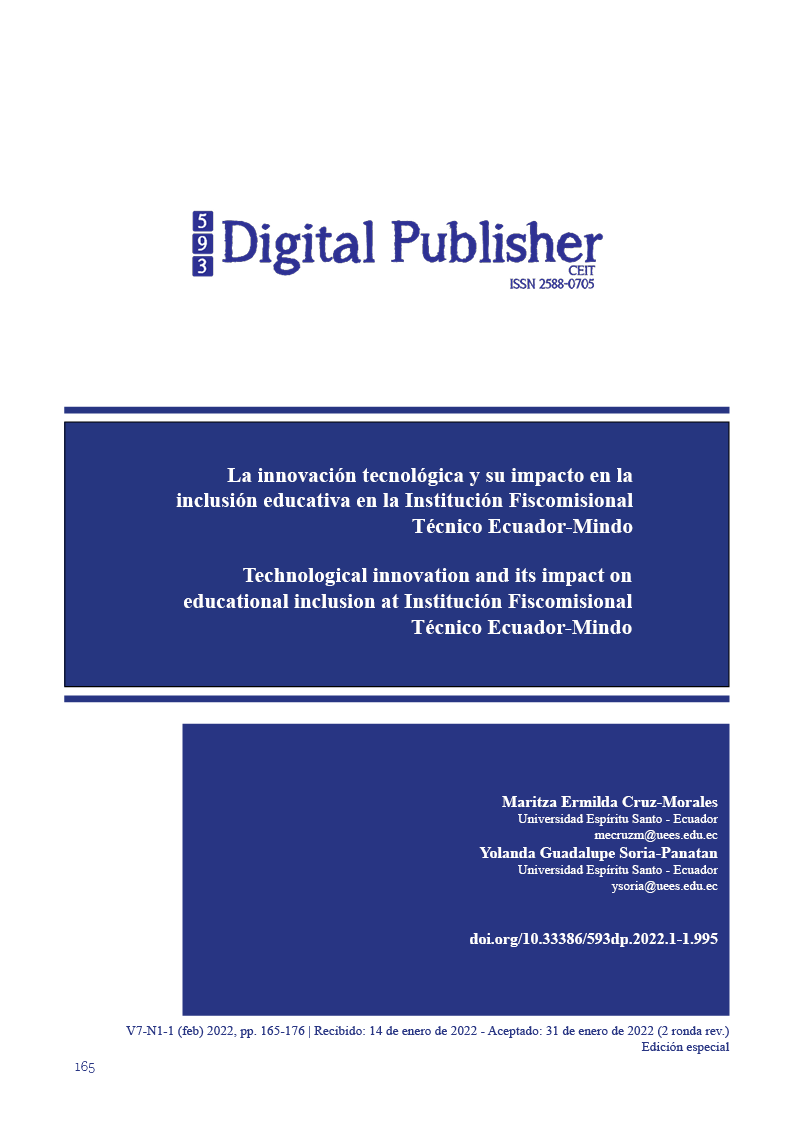La Technological innovation and its impact on educational inclusion at Institución Fiscomisional Técnico Ecuador-Mindo
Main Article Content
Abstract
Today the use of ICT Information and Communication Technology in the education of students with educational needs presents new challenges for governments, educational institutions and mainly for teachers, who have a greater challenge which must respond to the needs of each student to guarantee an inclusive environment, thus turning technologies into a positive resource to overcome barriers to access to information and communication.
The present research aims to analyze technological innovation and its impact on educational inclusion in the Ecuadorian Technical Fiscomisional Educational Institution, through training workshops for technical high school teachers, and in this way contribute to the proper use of digital tools in all students with and without Special Educational Needs. Two managers and one teacher at the technical high school level participated in the research to assess their individual or collective training needs. The research approach was qualitative, non-experimental, descriptive and analytical. The historical-logical method was applied, because a documentary review was made of how the training for teaching about inclusive education has been carried out in this institution, for example from the year 2000 to the present, combined with scientific articles about this topic in the Ecuadorian reality if possible in the region, since as teachers we must keep up with the changes.
Downloads
Article Details

This work is licensed under a Creative Commons Attribution-NonCommercial-ShareAlike 4.0 International License.
1. Derechos de autor
Las obras que se publican en 593 Digital Publisher CEIT están sujetas a los siguientes términos:
1.1. 593 Digital Publisher CEIT, conserva los derechos patrimoniales (copyright) de las obras publicadas, favorece y permite la reutilización de las mismas bajo la licencia Licencia Creative Commons 4.0 de Reconocimiento-NoComercial-CompartirIgual 4.0, por lo cual se pueden copiar, usar, difundir, transmitir y exponer públicamente, siempre que:
1.1.a. Se cite la autoría y fuente original de su publicación (revista, editorial, URL).
1.1.b. No se usen para fines comerciales u onerosos.
1.1.c. Se mencione la existencia y especificaciones de esta licencia de uso.
References
Arenas, C. (01 de mayo de 2016). Las TIC como recurso pedagógico del docente inclusivo. Recuperado el 17 de octubre de 2021, de https://revistaeducacioninclusiva.es/index.php/REI/article/viewFile/53/48
Sunkel, G., & Trucco, D. (Noviembre de 2012). Las tecnologías digitales frente a los desafíos de una educación inclusiva en América Latina Algunos casos de buenas prácticas. Recuperado el 13 de octubre de 2021, de https://repositorio.cepal.org/bitstream/handle/11362/35386/S2012809_es.pdf
Alvarez, L., & Gallegos, J. (31 de Mayo de 2021). Transformación conductual en estudiantes de bachillerato. Recuperado el 06 de diciembre de 2021, de https://revistas.uees.edu.ec/index.php/Podium/article/view/597/560
Buxarrais, M., & Ovide, E. (05 de Noviembre de 2011). El impacto de las nuevas tecnologías en la educación en valores del siglo XXI. Recuperado el 2021 de Octubre de 12, de http://www.scielo.org.mx/scielo.php?script=sci_arttext&pid=S1665-109X2011000200002
Chamba, A., Hermann, A., Balladares, J., Henríquez, E., Oseda, D., Mendivel, R., . . . Simbaña, V. (2020). Filosofía de la Innovación y de la Tecnología Educativa. Recuperado el 18 de octubre de 2021, de https://dspace.ups.edu.ec/bitstream/123456789/19314/1/INNOVACIO%CC%81N%20TECNOLO%CC%81GICA%20EN%20LA%20EDUCACIO%CC%81N.pdf
Correa , J., & De Pablos, J. (2009). Nueva Técnologias e Innovación Educativa. Recuperado el 17 de octubre de 2021, de https://www.redalyc.org/pdf/175/17512723009.pdf
Correa , J., & Pablos , J. (2009). Nuevas Técnologicas e innovación. Recuperado el 18 de octubre de 2021, de https://www.redalyc.org/pdf/175/17512723009.pdf
Correa, J., & Pablos, J. (2009). NUEVAS TECNOLOGÍAS E INNOVACIÓN EDUCATIVA. Obtenido de https://www.redalyc.org/pdf/175/17512723009.pdf
Díaz, G., & Salazar, D. (10 de marzo de 2021). La calidad como herramienta estratégica para la gestión empresarial. Recuperado el 08 de diciembre de 2021, de https://revistas.uees.edu.ec/index.php/Podium/article/view/547/539
DocuSing. (19 de mayo de 2021). Qué son las TICs, sus ventajas y ejemplos para incorporar en tu negocio. Recuperado el octubre de 18 de 2021, de https://www.docusign.mx/blog/TICs
Facultad de Ciencias Económicas. (28 de Julio de 2020). iclo de Talleres de Herramientas Digitales. Recuperado el 08 de diciembre de 2021, de https://fce.uncuyo.edu.ar/ciclo-de-talleres-de-herramientas-digitales
Hernández, H., Cardona, D., & Del Río, J. (2017). Proyección de la Innovación Tecnológica y Gestión Administrativa en las Pequeñas Empresas. Recuperado el 08 de diciembre de 2021, de https://scielo.conicyt.cl/scielo.php?pid=s0718-07642017000500003&script=sci_arttext
Hernández, R. (abril de 2014). Metodología de la Investigación (sexta edición ed.). México: McGRAW-HILL / INTERAMERICANA EDITORES, S.A. DE C.V. Recuperado el 14 de noviembre de 2021, de file:///C:/Users/USER/Desktop/UEES%202020/deberes/Metodologia%20de%20la%20investigaci%C3%B3n/Segunda%20entrega/primera%20entrega/Sexta%20Edici%C3%B3n%20de%20Roberto%20Hern%C3%A1ndez%20Sampieri(1).pdf
La Costitución de Ecuador. (2021). Personas con discapacidad. Recuperado el 13 de octbre de 2021, de https://educacion.gob.ec/wp-content/uploads/downloads/2012/08/Constitucion.pdf
Laitón, E., Gómez, S., Sarmiento, R., & Mejía, C. (2017). Competencia de prácticas inclusivas: las TIC y la educación inclusiva en el desarrollo profesional docente. Recuperado el 18 de octubre de 2021, de https://www.redalyc.org/pdf/4137/413751844009.pdf
Licona, A. (24 de octubre de 2018). Autoaprendizaje, emprendimiento e innovación educativa en el docente. Recuperado el 14 de noviembre de 2021, de https://www.unir.net/educacion/revista/autoaprendizaje-emprendimiento-e-innovacion-educativa-en-el-docente/
Lima, I., & Tobar, M. (12 de marzo de 2021). Calidad educativa desde la inclusión y su realidad en Ecuador. Recuperado el 18 de octubre de 2021, de https://www.593dp.com/index.php/593_Digital_Publisher/article/view/534
Luna, M. (01 de Diciembre de 2016). Tecnología y discapacidad: Una mirada pedagógica. Recuperado el 17 de octubre de 2021, de http://www.revista.unam.mx/vol.14/num12/art53/index.html
Maya, A. (2016). El taller educativo y su fundamentación pedagógica. Recuperado el 08 de diciembre de 2021, de https://www.magisterio.com.co/articulo/el-taller-educativo-y-su-fundamentacion-pedagogica
Ministerio de Educación. (s.f.). Escuelas inclusivas. Recuperado el 17 de octubre de 2021, de https://educacion.gob.ec/escuelas-inclusivas/
Morales, G., & Freire, J. (18 de Junio de 2021). La La innovación tecnológica: creando competitividad en las empresas desarrolladoras de software. Recuperado el diciembre de 06 de 2021, de https://revistas.uees.edu.ec/index.php/Podium/article/view/618/558
Moreira, M., & Alberto, P. (2015). De la marginación a la inclusión social: Ley de discapicidades. Recuperado el 06 de diciembre de 2020, de https://revistas.uees.edu.ec/index.php/Podium/article/view/54
Neira, M., & Pulgarín, E. (17 de Diciembre de 2020). La Innovación Educativa como herramienta pedagógica en el proceso de enseñanza-aprendizaje en tiempos de pandemia de la Unidad Educativa Fiscal José Jesús Ocampo Salazar. Recuperado el 17 de octubre de 2021, de https://www.593dp.com/index.php/593_Digital_Publisher/article/view/425
Parra, N., & Silva, A. (27 de diciembre de 2020). Liderazgo efectivo directivo y su incidencia en relaciones interpersonales docentes en Escuela José Mejía Lequerica. Recuperado el 06 de diciembre de 2020, de https://www.593dp.com/index.php/593_Digital_Publisher/article/view/412
Prince, A. (07 de junio de 2021). Aulas híbridas: Escenarios para transformación educativa dentro de la nueva normalidad. Recuperado el 08 de diciembre de 2021, de https://revistas.uees.edu.ec/index.php/Podium/article/view/592/545
Saldarriaga, C. (2015). Convención Naciones Unidas Derechos de las personas con discapacidad. Recuperado el 17 de octubre de 2021, de https://www.youtube.com/watch?v=qGQwNYd7uIc
UNESCO. (2021). Inclusión en la Educación. Recuperado el 13 de Octubre de 2021, de https://es.unesco.org/themes/inclusion-educacion
UNESCO. (2021). Las TIC en la educación. Recuperado el 18 de octubre de 2021, de https://es.unesco.org/themes/tic-educacion
Universidad de Antioquia. (s.f.). Conceptos básicos de qué es un taller participativo, como organizarlo y dirigirlo. Cómo evaluarlo. Recuperado el 14 de noviembre de 2021, de http://bibliotecadigital.udea.edu.co/bitstream/10495/2536/1/CentroEstudiosOpinion_conceptostallerparticipativo.pdf
Villarreal, B. (23 de septiembre de 2020). Educación, Innovación Tecnológica y su impacto socioeconómico. Recuperado el 18 de octubre de 2021, de http://caminante.usac.edu.gt/index.php/2020/09/23/9277/



